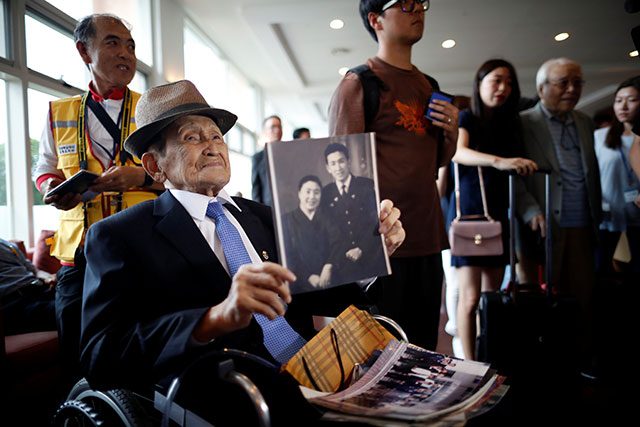
SEOUL/SOKCHO – Some 180 families torn apart by the 1950-53 Korean War will be temporarily reunited in North Korea starting Monday after the two Koreas renewed exchanges this year following a standoff over Pyongyang’s nuclear and missile programs.
The reunions, the first in three years, will take place in the North’s tourist resort on Mount Kumgang, as agreed by North Korean leader Kim Jong Un and South Korean President Moon Jae-in during their first summit in April.
The separated families are victims of a decades-long standoff between the neighbours, which has escalated over the past several years as Pyongyang rapidly advanced its nuclear weapons and missile programmes.
More than 57,000 South Korean survivors have registered for a brief family reunion, which lasts only 11 hours and often ends in painful farewells.
“I’m over 90 so I don’t know when I am going to die. I am very glad that I have been selected this time, I’m walking on air now,” 91-year-old Moon Hyun-sook told Reuters on Sunday, a day before meeting her younger sisters in North Korea.
For years, Seoul has been calling for regular meetings between separated families including using video conferences, but the reunion programs often fell victim to fragile relations with Pyongyang.
During his summit with U.S. President Donald Trump in June, Kim pledged to abandon his country’s nuclear programs if Washington provided security guarantees, but the two sides have since struggled to agree on how to reach that goal.
South Korean family members arrived at the coastal border city of Sokcho on Sunday to be briefed by officials on the reunion and for a brief health check-up, before crossing the border on Monday.
Ninety-three families from both sides of the border were initially scheduled for a three-day gathering from Monday, but four South Korean members cancelled their trip to the North at the last minute due to health conditions, the Red Cross said.
Starting Thursday, there will be a meeting of another 88 groups of relatives, according to Seoul’s Unification Ministry.
The brief family reunions, which began in 1985, can be a traumatic experience for the aging survivors, they say. And time is running out, with many of them aged 80 or older.
Around 132,600 individuals are listed as separated families as of end-July. Of the 57,000 survivors, 41.2 percent are in their 80s and 21.4 percent are in their 90s, according to government data.
The oldest South Korean participating in the latest gathering is 101 years old.
“Most participants are elderly and many of them are suffering from hypertension, diabetes and have underlying medical conditions. Ahead of the reunions, we are thoroughly checking their health conditions so that they can attend the events as planned,” said physician Han Sang-jo.
Many of the family members brought gifts for their North Korean relatives. Socks, underwear, basic winter jackets, medicine, toothpastes and food are the most common items, with gifts deemed too extravagant unlikely to pass muster with Pyongyang authorities.
“I’ve prepared for him some household medicine including digester and headache pills, nutritional supplements as well as some daily necessaries,” said Lee Soo-nam, a 76-year-old South Korean, due to meet his older brother in the North separated by the war.
“He is very old so I really want to express my gratitude for being alive for a long time.” -Reporting by Hyonhee Shin and Joyce Lee in SEOUL, Hyun Young Yi in SOKCHO, Editing by Soyoung Kim and Michael Perry



